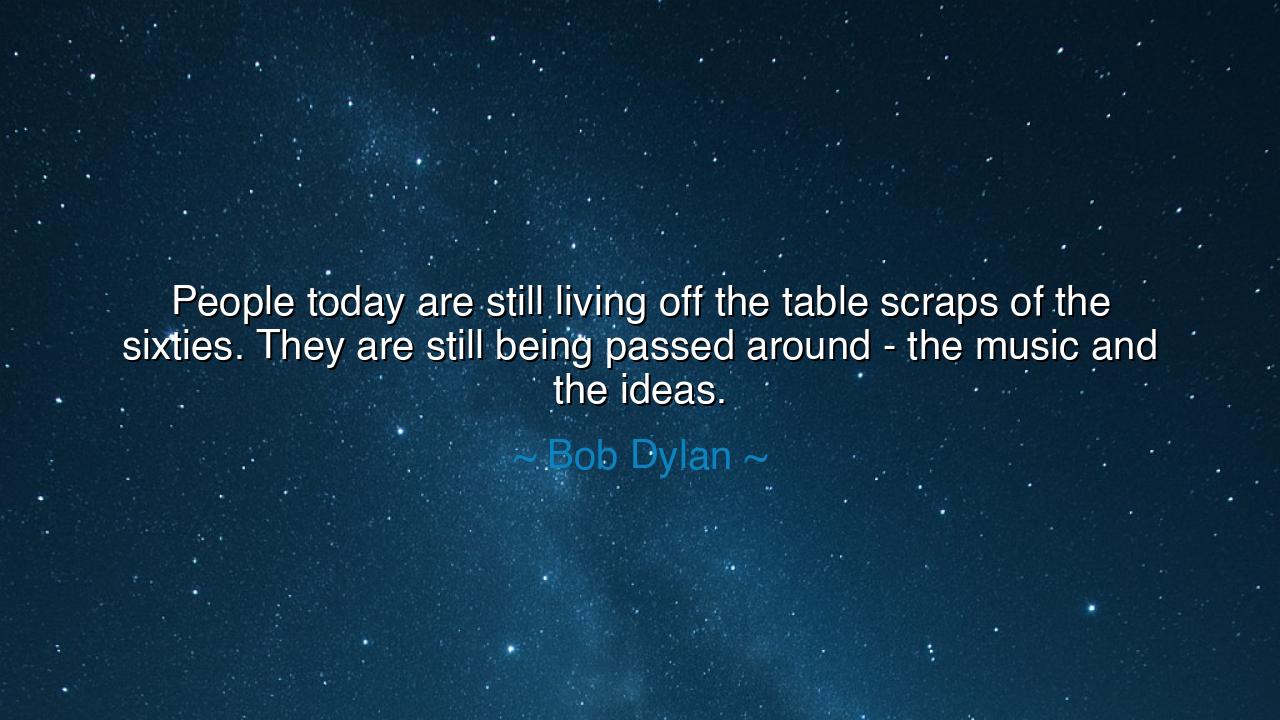
People today are still living off the table scraps of the
People today are still living off the table scraps of the sixties. They are still being passed around - the music and the ideas.






Hear the words of Bob Dylan, the prophet of his age: “People today are still living off the table scraps of the sixties. They are still being passed around—the music and the ideas.” At first, they strike with a sharp edge, almost dismissive. Yet within them lies a revelation about the power of one era to echo endlessly across generations. Dylan reminds us that the sixties were not merely years on a calendar, but a furnace in which new visions were forged—visions of freedom, rebellion, justice, and possibility. And even decades later, the world continues to feast, not upon fresh banquets, but upon the scraps of that great feast of ideas.
The sixties were a time of upheaval. Civil rights marched through the streets, war was questioned by the young, and the boundaries of art and thought were shattered. The music of that era—Dylan’s own ballads, the cries of Joan Baez, the anthems of The Beatles—were more than entertainment. They were weapons, prayers, and declarations of identity. The ideas born in that fire reshaped nations, giving voice to the voiceless and courage to the broken. It was a banquet of vision, set upon the table of history, and it nourished all who partook.
Yet Dylan’s words remind us of the danger of complacency. To live only on the scraps of the past is to forget that every generation must create its own feast. The music and ideas of the sixties remain alive, but if they are only recycled, only passed around, then their power diminishes. They inspire, yes, but they also challenge us: will we be content to inherit what was already made, or will we rise to craft visions of our own? Dylan speaks as the ancients once did, warning against the stagnation that comes from clinging only to the past.
History offers examples of this truth. Consider the Renaissance, when scholars and artists lived off the recovered scraps of ancient Greece and Rome. Their rediscovery of Plato, Aristotle, and classical art sparked a rebirth that transformed Europe. Yet the Renaissance was not merely imitation; it was the creation of something new. Michelangelo did not only copy the ancients—he surpassed them with works born of his own spirit. In this, we see Dylan’s challenge: the past can feed us, but it cannot be the sole meal of the present.
Dylan himself lived this lesson. He drew upon the ancient folk songs, the blues, and the hymns of forgotten America, but he reshaped them into something prophetic, fierce, and original. His ideas were not borrowed—they were reborn. When he warns of scraps, he is calling us to do as he did: to take what is given, but not to stop there; to create, to innovate, to add our own voices to the eternal chorus of history.
The meaning of Dylan’s words is both heavy and liberating. They remind us that greatness is not confined to one age, nor should it be idolized as untouchable. The sixties provided a banquet—but we dishonor it if we only pass around its leftovers. True honor is to set our own table, to contribute our own music and ideas, so that future generations may draw from us as we drew from those before.
Practical action lies before us: do not only consume the visions of the past, but create the visions of today. If you are an artist, do not only imitate the masters—speak your own truth. If you are a thinker, do not only quote the revolutionaries—dream your own revolution. If you are a leader, do not only recall the victories of old—fight the battles of now. For each generation must be the author of its own banquet, lest it starve on scraps.
So let Dylan’s words echo in your heart: “People today are still living off the scraps of the sixties… the music and the ideas.” Let them be both a reminder and a challenge. Draw strength from the past, yes, but do not remain bound to it. Create boldly, live truthfully, and pass on not only borrowed crumbs, but fresh bread. Thus will you honor the feast of the sixties—not by endlessly consuming it, but by setting the next table for generations yet to come.






AAdministratorAdministrator
Welcome, honored guests. Please leave a comment, we will respond soon